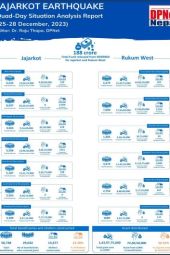Jajarkot Earthquake : Quad-Day Situation Report (25-28 Dec)
Summary
This report highlights the ongoing efforts and challenges in providing temporary shelter and support to earthquake affected people in Jajarkot and Rukum West districts. A commendable progress is with 13,667 temporary houses already built, accommodating 58,748 beneficiaries. Plans are going on to construct additional 15,000 shelters and accommodate an estimated 80,000 beneficiaries, with significant financial support of Rs 1.43 billion already disbursed. However, the process has been hindered by delays in fund disbursement due to various reason, leaving many affected people still in makeshift tents. The report highlights on the complexities of fund distribution, emphasizing the gap between disbursed amount and the actual receipt of funds. This discrepancy is notably visible in Bheri and Junichande Rural Municipalities, where a significant number of beneficiaries are yet to receive their initial grant. The situation is exacerbated by the municipalities' impotence to disburse funds effectively, leading to the stagnation of allocated resources.
In addition to these challenges, the report also touches upon insurance payouts in Rukum West. Two months post-earthquake, the national insurance company has begun distributing financial assistance to the families of the deceased. This initiative is part of a broader natural disaster accident insurance program conducted by Karnali Province that aims to provide relief to affected families. Banking hurdles have also emerged as a significant obstacle, particularly in the context of using existing social security accounts for grant distribution. The requirement to open new bank accounts has introduced delays and frustrations among the earthquake-affected populations. The DDMC has been organizing shelter cluster meetings to streamline information sharing and unify construction practices. However, discrepancies in grant amounts provided by different organizations and the lack of precise data on shelter construction have added to the confusion and complexity of the situation.
The government's proactive stance in safeguarding public health through a vaccination campaign against diseases like rubella, measles, and typhoid is a significant step in preventing potential outbreaks in the earthquake-affected regions. Finally, the report brings to light the plight of the most vulnerable, like Indra Kumari Shahi and her son, who face mental health challenges and are unable to actively participate in shelter construction. Their situation highlights the need for more inclusive and empathetic approaches in disaster management and support systems.
Categories:
DPNet Publication
Sub-Categories:
Situation Analysis Report
Publisher:
DPNet Nepal
Published Year:
2023
